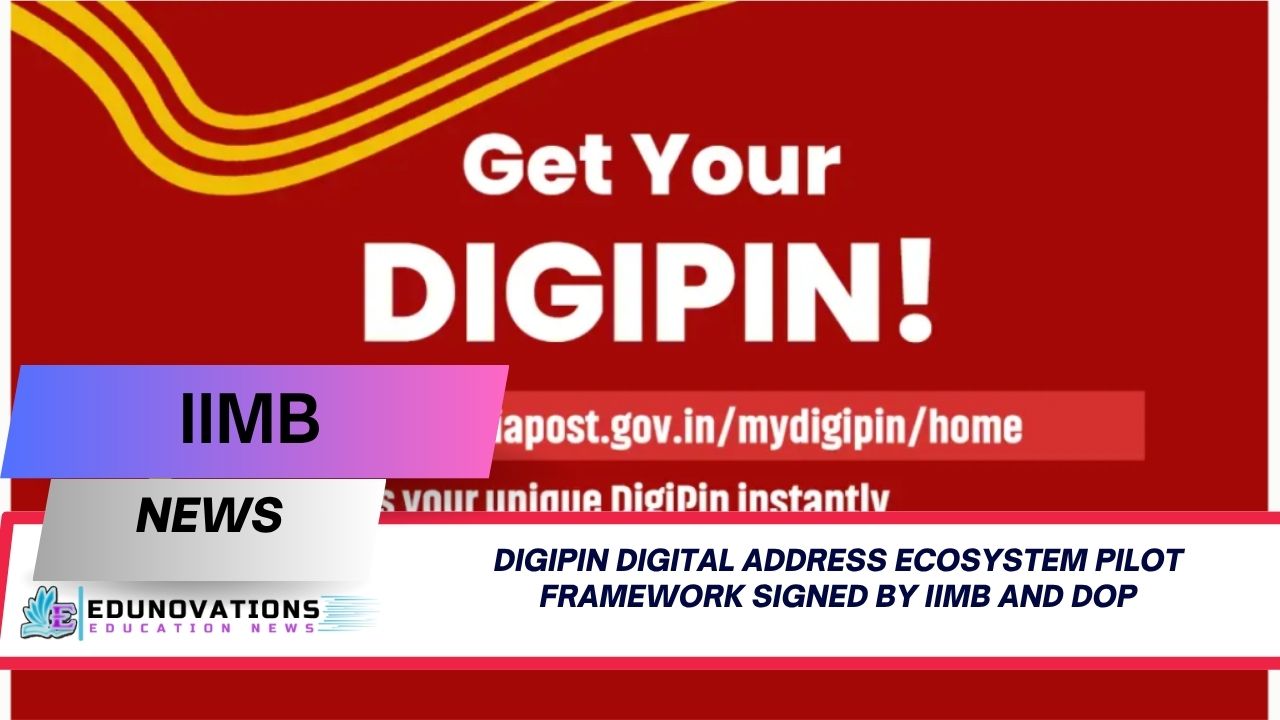India Post and IIM Bangalore partner to develop DIGIPIN digital address ecosystem pilot framework under a new MoU, aiming to transform public service delivery infrastructure.
IIM Bangalore and India Post Unite to Launch DIGIPIN Digital Address Ecosystem Pilot Framework
In a significant move to revolutionize India’s digital infrastructure, the Indian Institute of Management Bangalore (IIMB), through its Centre for Digital Public Goods (CDPG), has partnered with the Department of Posts (DoP) to launch the DIGIPIN digital address ecosystem pilot framework. This collaboration is aimed at transforming the way addresses are managed and utilized in both public and private sectors across the country.
The Memorandum of Understanding (MoU) was signed to create a citizen-centric digital address infrastructure, which will enable efficient and secure geocoded address systems through a new initiative titled DIGIPIN (Digital PIN). The pilot project is expected to redefine India’s digital public infrastructure (DPI), making services more accessible, interoperable, and inclusive.
The Need for a Geocoded Address System
Traditional address systems in India are often unstructured, non-standardized, and difficult to validate digitally. This lack of uniformity has resulted in inefficiencies across sectors—from logistics and emergency services to government benefits delivery. The interoperable geocoded addressing system for public services aims to resolve these inefficiencies.
The DIGIPIN initiative leverages the concept of Address-as-a-Service (AaaS) to build an adaptable and scalable infrastructure. Under this system, users will be assigned a unique digital address, mapped precisely with geolocation technology, ensuring authenticity and ease of access.
Toppers Use Mind Maps to score more than 95%
NCERT Class 11th Commerce Mind Maps
Add to cartOriginal price was: ₹999.00.₹199.00Current price is: ₹199.00.NCERT Class 12th Chemistry Mind Maps
Add to cartOriginal price was: ₹199.00.₹75.00Current price is: ₹75.00.NCERT Class 12th Commerce Mind Maps
Add to cartOriginal price was: ₹999.00.₹199.00Current price is: ₹199.00.NCERT Class 12th Science Mind Maps
Add to cartOriginal price was: ₹999.00.₹199.00Current price is: ₹199.00.NCERT Mind Maps For Class 10th
Add to cartOriginal price was: ₹999.00.₹199.00Current price is: ₹199.00.
Purchase Today
Highlights of the DIGIPIN Initiative
- Pilot launch across select urban and rural regions
- Geo-tagged digital addresses for better service targeting
- Integration with postal services and other government schemes
- Focus on citizen centric digital address infrastructure solution DIGIPIN
- Support for eCommerce, logistics, emergency services, and welfare programs
- Privacy-preserving technology architecture for secure data handling
Public Sector Innovation with Private Sector Adaptability
The project will initially test a framework for standardized digital addressing public infrastructure, combining best practices from both public governance and private innovation.
According to CDPG’s researchers, the DIGIPIN model will not only help government departments but also serve fintech firms, gig economy platforms, and health services that rely on precise customer locations.
Expert Insights and Vision for the Future
Speaking at the MoU signing, Prof. Rahul De’, Chairperson at CDPG, stated:
“DIGIPIN is a transformative step towards building a location-aware society. With this partnership, we are laying the groundwork for a digital India that is inclusive, efficient, and future-ready.”
The Department of Posts, one of India’s oldest and most trusted government institutions, sees this initiative as a natural evolution in its service delivery. DIGIPIN will make postal services faster, smarter, and more digitally aligned.
Statistics That Support the Need for DIGIPIN
- Over 35% of Indian addresses are currently non-standardized or ambiguous
- 60% of last-mile delivery issues in rural areas are due to poor address mapping
- India’s logistics sector loses an estimated ₹15,000 crore annually due to address-related inefficiencies
DIGIPIN is expected to reduce these losses significantly while enhancing governance and economic participation.
A Model for the World
This MoU represents more than a bilateral partnership—it serves as a model for digital address innovation that could be replicated globally, especially in developing economies. The interoperable nature of the system makes it easy to integrate with other digital identity platforms, such as Aadhaar or DigiLocker.
Linking with India’s Broader DPI Strategy
DIGIPIN is part of India’s larger push towards Digital Public Infrastructure (DPI), aligning with initiatives like UPI, ONDC, and National Digital Health Mission. It strengthens the country’s ability to provide real-time, secure, and inclusive services to its citizens.
How EdTech and Other Sectors Can Leverage DIGIPIN
For platforms like Edunovations, which offer NCERT courses, MCQs, syllabi, and video content, the DIGIPIN infrastructure could drastically improve learner access. With address-based analytics, students from remote areas could be better served with regionally curated content, downloadable NCERT PDFs, and mind maps.
India’s First Address-as-a-Service Platform?
If successfully implemented, DIGIPIN may well be India’s first full-fledged Address-as-a-Service implementation model for India Post, enabling public agencies to offer address validation, authentication, and updates just like digital identity verification services.
External Tech and Infrastructure Partners
The MoU may open opportunities for digital service providers and startups. Companies like Mart India Infotech may become vital in building secure digital platforms for educational institutions and small businesses wanting to embed DIGIPIN into their operations.
Challenges Ahead
While the ambition is strong, challenges remain:
- Public awareness and adoption
- Data privacy and interoperability with existing platforms
- Rural internet access and training
However, these are surmountable with strong policy backing and sustained academic-government collaboration.
A Step Toward Smart Governance
By introducing a reliable digital address system, India is moving toward smarter governance. Services like property registration, voter ID, ration cards, and even NCERT curriculum delivery stand to benefit from geocoded, standardized address references.
Conclusion
The signing of the MoU between IIM Bangalore and the Department of Posts marks a critical milestone in India’s journey toward a unified, efficient, and inclusive digital infrastructure. The DIGIPIN digital address ecosystem pilot framework is not merely a tech solution—it is a public utility poised to uplift millions through better service delivery, economic participation, and digital inclusion.
❓Frequently Asked Questions (FAQs)
1. What is DIGIPIN digital address ecosystem pilot framework?
DIGIPIN is a digital initiative to create geocoded, standardized addresses for public and private service delivery.
2. Who signed the MoU for the DIGIPIN initiative?
IIM Bangalore’s CDPG and the Department of Posts jointly signed the MoU.
3. What is the main benefit of an interoperable geocoded addressing system for public services?
It ensures accurate service delivery and streamlines operations for both government and private sectors.
4. How does DIGIPIN support citizen-centric digital address infrastructure solutions?
By offering privacy-respecting, geo-verified addresses linked to individuals or households.
5. What is Address-as-a-Service implementation model for India Post?
It refers to enabling India Post to validate and provide digital addresses like a utility service.
6. How will DIGIPIN affect eCommerce and logistics sectors?
It will improve last-mile delivery efficiency and reduce location errors.
7. Is DIGIPIN part of India’s broader digital public infrastructure efforts?
Yes, it aligns with initiatives like UPI, DigiLocker, and ONDC.
8. Can students or educational platforms benefit from DIGIPIN?
Yes, platforms like Edunovations can deliver targeted educational services.
9. What are the challenges in implementing DIGIPIN across India?
Challenges include public awareness, digital literacy, and infrastructure access in rural areas.
10. Is the DIGIPIN model replicable outside India?
Yes, it can be adapted for other developing countries seeking efficient address systems.














